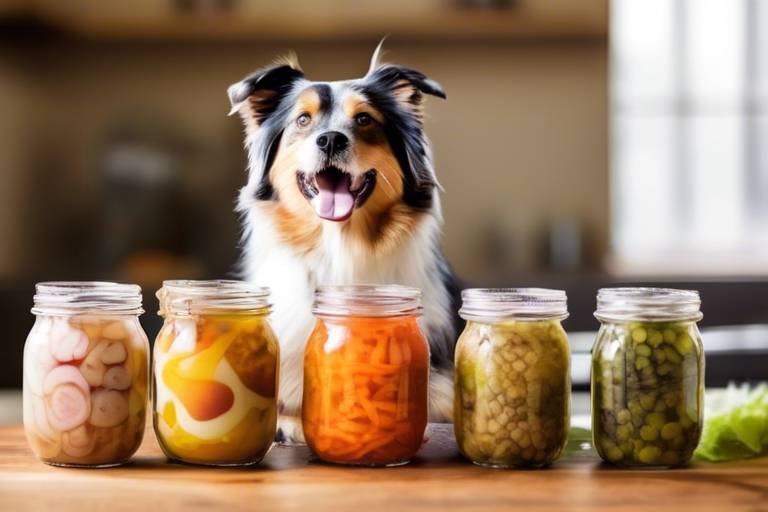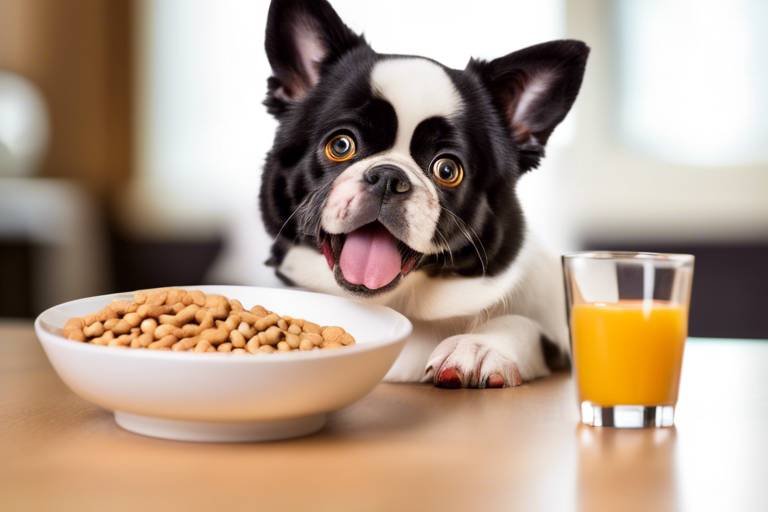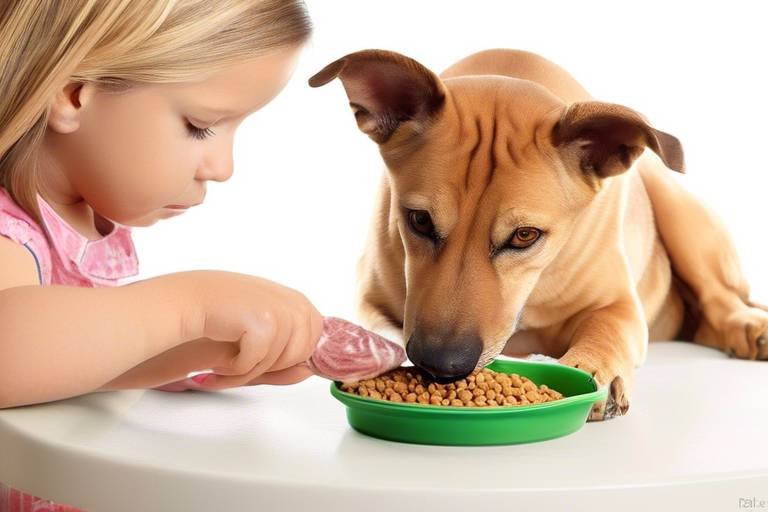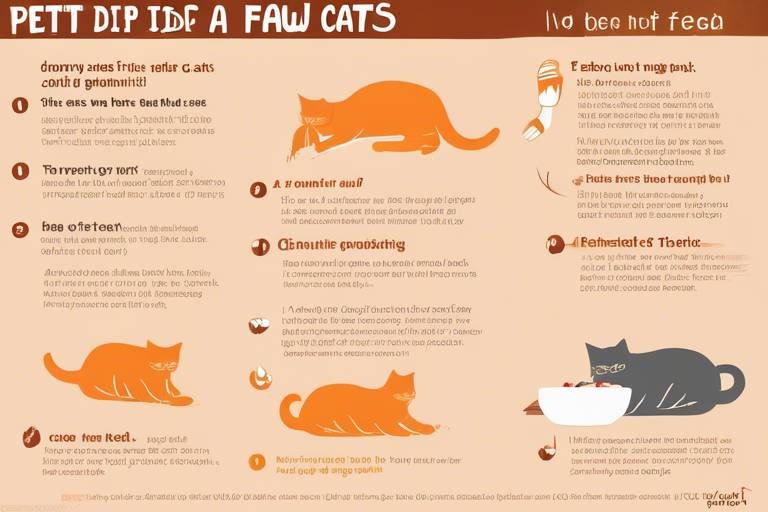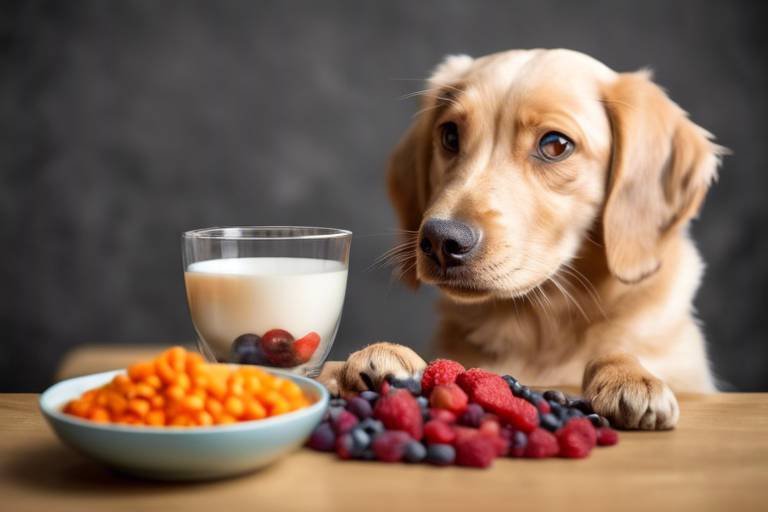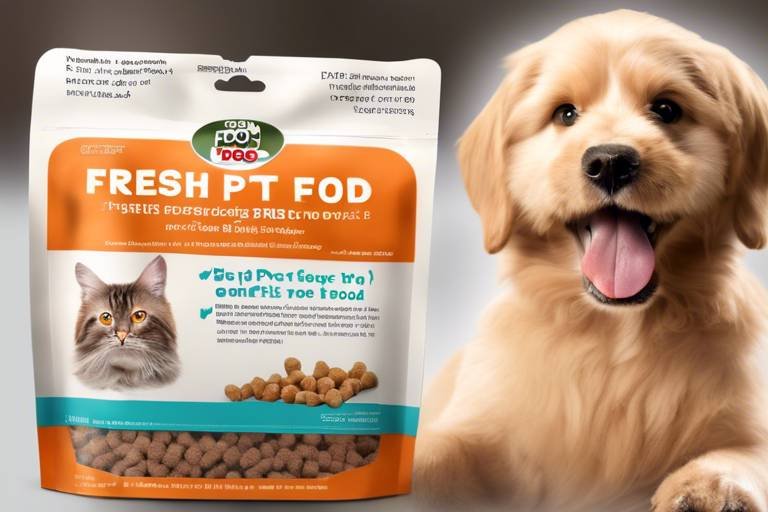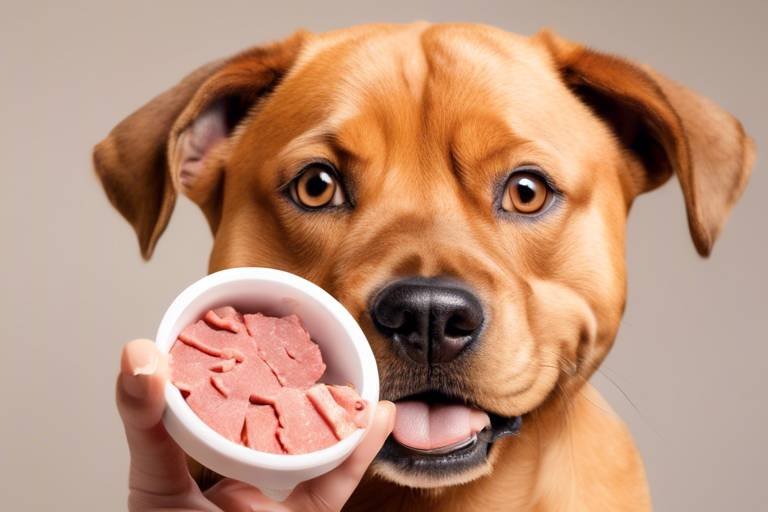Understanding the Benefits of Fermented Foods for Pets
When it comes to our furry friends, we all want the best for them, right? Incorporating fermented foods into their diet might just be one of the best decisions you can make. These foods, rich in probiotics and nutrients, can transform your pet's health in ways you might not have imagined. Imagine your pet bounding around with energy, their coat shining, and their stomachs happy! That's the magic of fermented foods. But what exactly are these foods, and why should you consider adding them to your pet's meals? Let’s dive in and explore the myriad of benefits that fermented foods can offer to your beloved companions.
Fermented foods are essentially foods that have undergone a process called lacto-fermentation. This process not only preserves the food but also enhances its nutritional content. Think of it as nature’s way of supercharging food! During fermentation, beneficial bacteria break down sugars and starches, transforming them into probiotics and enzymes that are incredibly beneficial for digestion. For pets, this means a healthier gut and improved nutrient absorption. It's fascinating how something as simple as fermentation can lead to such profound health benefits, isn’t it?
So, what can fermented foods do for your pet? Well, the list is quite impressive! These foods can improve digestion, boost immune function, and enhance nutrient absorption. It’s like giving your pet a health upgrade! Imagine your pet feeling lighter, more energetic, and less prone to illnesses. That’s the potential impact of incorporating these foods into their diet. In the following sections, we’ll break down these benefits even further, so you can see just how much of a difference fermented foods can make.
One of the standout benefits of fermented foods is their ability to promote healthy digestion in pets. The probiotics and enzymes found in these foods are like tiny superheroes for your pet’s gut! They help balance the gut flora, which is crucial for digesting food properly. If your pet has ever experienced digestive issues, you know how uncomfortable that can be for them. Fermented foods can alleviate these problems, making mealtime a joy instead of a chore.
Gastrointestinal problems, such as diarrhea and constipation, can be common in pets. Fermented foods can help reduce these issues by balancing gut flora and improving overall digestive function. When your pet's gut is happy, they are less likely to experience the discomfort that comes with these problems. It’s like having a built-in support system for their digestive health!
Another fantastic benefit of probiotics found in fermented foods is their ability to enhance nutrient absorption. This means that your pet will get maximum benefit from their food, leading to better overall health. Think of it as ensuring that every bite they take is packed with goodness. It’s a win-win situation for both you and your furry friend!
Did you know that a healthy gut is directly linked to a strong immune system? Fermented foods can bolster your pet's immune system by promoting a healthy gut microbiome. This is crucial in helping your pet resist diseases and infections. It’s like giving them a shield to protect them from the outside world. A robust immune system means fewer trips to the vet and a happier, healthier pet!
Now that you’re sold on the benefits of fermented foods, how do you choose the right ones for your pet? Not all fermented products are created equal, and it’s essential to select options that are safe and beneficial. After all, you want to ensure that your pet is getting the best of the best!
Some safe fermented foods for pets include:
- Plain yogurt - A great source of probiotics.
- Kefir - Packed with beneficial bacteria and easy to digest.
- Fermented vegetables - Such as sauerkraut or kimchi (make sure they are pet-safe and free from harmful ingredients).
These options are rich in beneficial bacteria and can be easily incorporated into your pet's diet. Just remember to introduce any new food gradually to avoid upsetting their stomachs.
On the flip side, it's crucial to avoid certain fermented foods that can be harmful to pets. Foods containing added sugars, artificial ingredients, or spices can pose risks. Always check the labels and opt for natural, unprocessed options. Your pet's safety and health should always come first!
Q: Can all pets eat fermented foods?
A: While most pets can benefit from fermented foods, it’s always best to consult your veterinarian, especially if your pet has specific health conditions.
Q: How should I introduce fermented foods to my pet's diet?
A: Start with small amounts and gradually increase to allow your pet’s digestive system to adjust.
Q: Are there any side effects?
A: Some pets may experience mild digestive upset when first introduced to fermented foods. Monitor your pet and consult your vet if any concerns arise.

What Are Fermented Foods?
Fermented foods are a fascinating category of edibles that have undergone a transformation through a process called lacto-fermentation. This natural process involves the breakdown of sugars by bacteria and yeast, creating a rich tapestry of flavors and enhancing the nutritional profile of the food. Imagine taking something as simple as cabbage and turning it into tangy sauerkraut or crunchy kimchi; that’s the magic of fermentation! Not only does this process preserve food, but it also enriches it with beneficial bacteria, known as probiotics, which are essential for gut health.
Understanding fermented foods is crucial for pet owners who want to boost their furry friends' health. Just like humans, pets can benefit immensely from the probiotics found in these foods. They help maintain a balanced gut microbiome, which plays a pivotal role in digestion and overall well-being. Fermented foods can range from dairy-based options like yogurt and kefir to plant-based options such as fermented vegetables. Each of these options brings its unique set of nutrients and flavors that can make your pet's diet not only healthier but also more enjoyable.
To give you a clearer picture, here’s a quick overview of some common fermented foods suitable for pets:
| Fermented Food | Benefits | How to Serve |
|---|---|---|
| Plain Yogurt | Rich in probiotics | Mix with food or serve as a treat |
| Kefir | Supports digestion | Pour over dry food or serve alone |
| Fermented Vegetables | Boosts nutrient intake | Chop and mix into meals |
Incorporating these fermented foods into your pet's diet can be a game-changer, promoting a healthier gut and overall vitality. However, it's essential to introduce these foods gradually and monitor for any adverse reactions, as every pet is unique. So, the next time you think about your pet's diet, remember that a little fermentation can go a long way in enhancing their health and happiness!

Health Benefits of Fermented Foods
This article explores the various advantages of incorporating fermented foods into your pet's diet, highlighting their health benefits, nutritional value, and potential impact on overall well-being.
Fermented foods are those that have undergone a process of lacto-fermentation, which preserves and enhances their nutritional content. Understanding these foods is essential for recognizing their benefits for pets.
When it comes to our furry friends, the health benefits of fermented foods are nothing short of remarkable! Imagine your pet's gut as a bustling city; fermented foods act like the friendly traffic cops, ensuring everything flows smoothly. These foods are packed with probiotics and enzymes, which work together to support healthy digestion, boost the immune system, and enhance nutrient absorption. Let’s dive deeper into these benefits!
One of the primary benefits of fermented foods is their ability to promote healthy digestion in pets. Just like us, pets can experience digestive hiccups, and fermented foods can help alleviate these issues. The probiotics found in these foods are like little superheroes for your pet’s gut, fighting off bad bacteria and fostering a balanced microbiome. This balance is essential for preventing digestive discomfort and ensuring your pet feels their best.
Fermented foods can significantly reduce common gastrointestinal problems in pets, such as diarrhea and constipation. Think of it this way: when the gut flora is out of whack, it’s like a chaotic party where no one knows the rules. Fermented foods help restore order by introducing beneficial bacteria that balance the gut environment. This can lead to:
- Fewer instances of diarrhea
- Less constipation
- Overall improved digestive function
Another fantastic benefit is the enhancement of nutrient absorption. The probiotics in fermented foods help break down nutrients, making them more accessible for your pet’s body to absorb. It’s like turning a locked door into an open gateway! This means that your pet can get the maximum benefit from their food, supporting their overall health and vitality. Imagine your pet thriving with energy, all thanks to the right nutrients being delivered effectively!
Fermented foods play a crucial role in bolstering your pet’s immune system. A healthy gut microbiome is vital for immune function and disease resistance. When the gut is thriving, it creates a strong defense against illnesses, much like having a well-trained army ready to protect a fortress. Including fermented foods in your pet’s diet can help ensure that their immune system is robust and ready to tackle any threats.
Selecting appropriate fermented foods for pets is vital. Not all fermented products are suitable, so understanding which options are safe and beneficial is essential for pet owners.
Some safe fermented foods for pets include plain yogurt, kefir, and fermented vegetables. These options are rich in beneficial bacteria and can be easily incorporated into a pet's diet.
Certain fermented foods, like those containing added sugars or artificial ingredients, can be harmful to pets. It's crucial to avoid these products to ensure your pet's safety and health.
Q1: Can all pets consume fermented foods?
A1: While most pets can benefit from fermented foods, it's essential to consult your veterinarian, especially if your pet has specific health conditions or dietary restrictions.
Q2: How can I introduce fermented foods to my pet?
A2: Start with small amounts and gradually increase the quantity to see how your pet reacts. Monitor for any digestive upset and adjust accordingly.
Q3: Are there any risks associated with fermented foods?
A3: Yes, some fermented foods can contain harmful ingredients, like added sugars or spices. Always choose pet-safe options and consult your vet if unsure.
Q4: How often should I give my pet fermented foods?
A4: Moderation is key! A few times a week is generally sufficient, but this can vary based on your pet's individual needs.
Improved Digestion
This article explores the various advantages of incorporating fermented foods into your pet's diet, highlighting their health benefits, nutritional value, and potential impact on overall well-being.
Fermented foods are those that have undergone a process of lacto-fermentation, which preserves and enhances their nutritional content. Understanding these foods is essential for recognizing their benefits for pets.
Fermented foods offer numerous health benefits for pets, including improved digestion, enhanced immune function, and better nutrient absorption. These advantages can lead to a healthier, happier pet.
One of the primary benefits of fermented foods is their ability to promote healthy digestion in pets. Just like us, our furry friends can experience a range of digestive issues, from bloating to irregular bowel movements. Fermented foods are packed with probiotics and enzymes that work wonders for gut health. Think of probiotics as little warriors that fight off bad bacteria in the gut, ensuring that your pet's digestive system runs smoothly. When you introduce these foods into your pet's diet, you're essentially giving their gut a much-needed boost.
Imagine your pet's gut as a bustling city. In a well-functioning city, traffic flows smoothly, and everything works in harmony. However, when bad bacteria invade, it’s like a traffic jam that disrupts the entire system. Fermented foods help clear the congestion by rebalancing the gut flora, leading to improved digestion and overall health.
Fermented foods can help reduce common gastrointestinal problems in pets, such as diarrhea and constipation, by balancing gut flora and improving overall digestive function. When your pet's gut is in balance, they are less likely to experience discomfort, and you can say goodbye to those messy accidents on the carpet!
In fact, studies have shown that pets consuming fermented foods tend to have more regular bowel movements. This is largely due to the fiber found in many fermented options, which acts like a broom, sweeping through the intestines and keeping everything tidy. With the right balance of probiotics and fiber, your pet can enjoy a digestive system that's as smooth as butter.
The probiotics found in fermented foods can enhance nutrient absorption, ensuring that pets receive maximum benefit from their diets and supporting their overall health. Think of probiotics as tiny helpers that assist in breaking down food, making it easier for your pet's body to absorb essential vitamins and minerals.
When your pet consumes a meal, the nutrients need to be extracted efficiently. If their digestive system is sluggish or imbalanced, they might not be getting all the good stuff they need to thrive. By incorporating fermented foods into their diet, you can help ensure that they’re not just eating but truly benefiting from what they consume.
To summarize, improving digestion in your pet through fermented foods is not just about alleviating discomfort; it's about enhancing their overall quality of life. A happy gut leads to a happy pet, and who doesn’t want that?
Selecting appropriate fermented foods for pets is vital. Not all fermented products are suitable, so understanding which options are safe and beneficial is essential for pet owners.
Some safe fermented foods for pets include plain yogurt, kefir, and fermented vegetables. These options are rich in beneficial bacteria and can be easily incorporated into a pet's diet.
Certain fermented foods, like those containing added sugars or artificial ingredients, can be harmful to pets. It's crucial to avoid these products to ensure your pet's safety and health.
- Can all pets eat fermented foods? - While many pets can benefit from fermented foods, it's essential to consult your veterinarian, especially if your pet has specific dietary needs or health issues.
- How much fermented food should I give my pet? - Start with small amounts and gradually increase to see how your pet reacts. A good rule of thumb is to keep it to about 10% of their daily diet.
- Are there any side effects? - Some pets may experience mild digestive upset when first introduced to fermented foods. It's best to start slowly and monitor their reactions.
Reducing Gastrointestinal Issues
Gastrointestinal issues can be a real pain for our furry friends, leading to discomfort, irritability, and even a reluctance to eat. Fortunately, incorporating fermented foods into your pet's diet can significantly help in reducing these gastrointestinal problems. The magic lies in the probiotics and enzymes naturally present in these foods, which work like tiny superheroes in your pet's gut. They help balance gut flora, promoting a healthier digestive environment.
When pets consume fermented foods, they essentially get a dose of beneficial bacteria that can crowd out harmful pathogens. This process is akin to filling a crowded bus with friendly passengers instead of rowdy troublemakers. The friendly bacteria take the lead, helping to restore balance and harmony in the digestive tract. As a result, issues like diarrhea and constipation can be alleviated, making for a much happier pet.
Furthermore, the fermentation process breaks down food components into simpler, more digestible forms. This means that your pet’s body can absorb nutrients more efficiently, leading to improved overall health. Imagine trying to fit a large suitcase into a tiny car; it just doesn’t work well. But when you break that suitcase down into smaller bags, everything fits perfectly! Similarly, fermented foods help your pet's digestive system work more smoothly.
To illustrate this further, consider the following table that summarizes how fermented foods can assist in reducing common gastrointestinal issues:
| Gastrointestinal Issue | How Fermented Foods Help |
|---|---|
| Diarrhea | Probiotics help restore balance in gut bacteria, reducing the occurrence of loose stools. |
| Constipation | Fermented foods add moisture and promote regular bowel movements. |
| Bloating | Enzymes in fermented foods aid in the breakdown of food, reducing gas buildup. |
Incorporating fermented foods into your pet's diet can be as simple as adding a spoonful of plain yogurt or a small serving of kefir to their meals. However, it's essential to introduce these foods gradually to avoid overwhelming their digestive systems. Think of it like introducing a new toy to a child; you wouldn’t throw them into a room full of new toys all at once, right? Start with small amounts and monitor how your pet responds. If they seem to enjoy it and their digestive health improves, you can slowly increase the serving size.
In conclusion, if you want to help your pet feel more comfortable and happy, consider the benefits of fermented foods. By reducing gastrointestinal issues through improved digestion and nutrient absorption, you’re not just feeding them; you’re enhancing their quality of life.
- What types of fermented foods are safe for pets? Plain yogurt, kefir, and fermented vegetables are excellent options.
- How much fermented food should I give my pet? Start with small amounts and gradually increase based on your pet's tolerance and response.
- Can all pets eat fermented foods? While most pets can benefit, it's best to consult with your veterinarian, especially if your pet has existing health issues.
Enhancing Nutrient Absorption
When it comes to our furry friends, ensuring they get the most out of their food is crucial. That's where fermented foods come into play! These remarkable foods contain probiotics, which are beneficial bacteria that can significantly enhance the way pets absorb nutrients from their diets. Imagine your pet's digestive system as a sponge; the more efficient it is, the more nutrients it can soak up! By incorporating fermented foods into your pet's meals, you're essentially supercharging their ability to extract vitamins and minerals from the food they consume.
But how exactly do these probiotics work their magic? Firstly, they help break down complex nutrients into simpler forms that are easier for your pet's body to absorb. For example, proteins are broken down into amino acids, and carbohydrates are simplified into sugars. This process not only makes digestion smoother but also ensures that your pet receives all the essential nutrients they need for optimal health.
Moreover, fermented foods can also enhance the gut environment, creating a more favorable habitat for nutrient absorption. A healthy gut microbiome, supported by the probiotics in fermented foods, can lead to increased levels of digestive enzymes. These enzymes are like little helpers that assist in breaking down food more effectively. With a well-balanced gut flora, your pet can experience improved digestion and, consequently, better nutrient uptake.
Let’s not forget that the benefits of enhanced nutrient absorption extend beyond just a healthier gut. When pets can effectively absorb nutrients, they tend to have more energy, a shinier coat, and improved overall well-being. Think of it as fueling a car with high-quality gas; it runs better, lasts longer, and performs at its peak. Just like that car, your pet will thrive when their bodies are equipped with the right nutrients!
Incorporating fermented foods into your pet's diet doesn’t have to be complicated. Here are some simple options that can easily be added to their meals:
- Plain Yogurt: A great source of probiotics, just make sure it’s unsweetened and free of artificial ingredients.
- Kefir: This fermented milk drink is packed with beneficial bacteria and can be a tasty treat for pets.
- Fermented Vegetables: Foods like sauerkraut or kimchi (without spices) can be a crunchy addition to your pet's diet.
In conclusion, enhancing nutrient absorption through fermented foods is a simple yet effective way to boost your pet's health. By promoting a healthy gut and improving the efficiency of nutrient uptake, you’re setting your furry friend up for a happier, healthier life. So, why not give it a try? Your pet will thank you in more ways than one!
Q: Can all pets benefit from fermented foods?
A: Yes, most pets can benefit from fermented foods, but it's always best to consult your veterinarian, especially if your pet has specific dietary needs or health issues.
Q: How much fermented food should I give my pet?
A: Start with small amounts, such as a teaspoon for small pets and a tablespoon for larger ones. Gradually increase the quantity while monitoring your pet's response.
Q: Are there any fermented foods I should avoid?
A: Yes, avoid fermented foods that contain added sugars, artificial flavors, or spices. Always choose plain, natural options to ensure your pet's safety.
Boosting Immune System
This article explores the various advantages of incorporating fermented foods into your pet's diet, highlighting their health benefits, nutritional value, and potential impact on overall well-being.
Fermented foods are those that have undergone a process of lacto-fermentation, which preserves and enhances their nutritional content. Understanding these foods is essential for recognizing their benefits for pets.
Fermented foods offer numerous health benefits for pets, including improved digestion, enhanced immune function, and better nutrient absorption. These advantages can lead to a healthier, happier pet.
One of the primary benefits of fermented foods is their ability to promote healthy digestion in pets. Probiotics and enzymes in these foods support gut health and can alleviate digestive issues.
Fermented foods can help reduce common gastrointestinal problems in pets, such as diarrhea and constipation, by balancing gut flora and improving overall digestive function.
The probiotics found in fermented foods can enhance nutrient absorption, ensuring that pets receive maximum benefit from their diets and supporting their overall health.
When it comes to keeping our furry friends healthy, a robust immune system is crucial. Fermented foods are like little superheroes for your pet’s gut, working tirelessly to strengthen their immune defenses. These foods are rich in probiotics, which are beneficial bacteria that help maintain a balanced gut microbiome. Did you know that about 70% of a pet's immune system is located in the gut? That’s right! A healthy gut can lead to a healthier pet overall.
Incorporating fermented foods into your pet’s diet can enhance their immune response in several ways:
- Promoting Healthy Gut Flora: The probiotics in fermented foods help cultivate a thriving community of good bacteria in your pet's gut. This community plays a pivotal role in fending off harmful pathogens.
- Reducing Inflammation: Fermented foods can help lower inflammation levels in the body, which is often a precursor to many diseases. A diet rich in probiotics can help keep those pesky inflammatory responses at bay.
- Enhancing Nutrient Absorption: As mentioned earlier, a well-functioning digestive system means better absorption of essential nutrients. This is vital for maintaining a strong immune system.
Moreover, studies have shown that pets consuming fermented foods are less prone to infections and illnesses. It’s almost like giving your pet a shield of armor against diseases! Imagine how much peace of mind you would have knowing that you’re actively supporting your pet’s health with every meal.
However, it’s essential to introduce these foods gradually into your pet's diet. Start with small amounts and monitor how they react. Just like us, pets can have varying sensitivities. With the right balance, your furry friend will be on their way to enjoying the myriad of benefits that fermented foods offer!
Selecting appropriate fermented foods for pets is vital. Not all fermented products are suitable, so understanding which options are safe and beneficial is essential for pet owners.
Some safe fermented foods for pets include plain yogurt, kefir, and fermented vegetables. These options are rich in beneficial bacteria and can be easily incorporated into a pet's diet.
Certain fermented foods, like those containing added sugars or artificial ingredients, can be harmful to pets. It's crucial to avoid these products to ensure your pet's safety and health.
Q: Can all pets consume fermented foods?
A: While many pets can benefit from fermented foods, it’s always best to consult with your veterinarian before introducing new foods to their diet, especially if they have existing health concerns.
Q: How often should I give my pet fermented foods?
A: Start with small amounts a few times a week and adjust based on your pet's individual needs and reactions.
Q: Are there any side effects?
A: Some pets may experience mild digestive upset when first introduced to fermented foods. Gradually increasing the amount can help mitigate this.

Choosing the Right Fermented Foods
When it comes to for your furry friends, it’s essential to tread carefully. Not all fermented products are created equal, and some can even be detrimental to your pet's health. Think of it like picking the perfect treat for your best buddy; you wouldn’t want to give them something that could upset their tummy or worse! So, how do you navigate this world of fermented foods?
First off, it’s vital to understand that not every fermented food is safe for pets. While many human foods are beneficial, some can contain ingredients that are harmful to animals. For example, fermented foods that are high in sugar or contain artificial additives can lead to a host of health problems, from obesity to gastrointestinal distress. So, what should you look for?
Here are some safe fermented options that can be easily incorporated into your pet's diet:
- Plain Yogurt: This is a great source of probiotics. Just make sure it’s free from added sugars and artificial flavors.
- Kefir: Similar to yogurt but even richer in probiotics, kefir can be a fantastic addition to your pet's meals.
- Fermented Vegetables: Foods like sauerkraut or kimchi can be beneficial, but ensure they are free from garlic and onions, which are toxic to pets.
Now, while these options are generally safe, it’s crucial to introduce them gradually into your pet’s diet. Start with small amounts to see how they react. Think of it as a new adventure in their culinary experience! Just like humans, pets can have different reactions to new foods, so monitor them closely for any signs of discomfort.
On the flip side, avoiding harmful fermented foods is equally important. Here are some types of fermented foods you should steer clear of:
- Fermented Foods with Added Sugars: Many commercial yogurts and other fermented products contain sugars that are not suitable for pets.
- Alcoholic Fermented Foods: This includes products like kombucha, which can be harmful due to their alcohol content.
- Fermented Foods with Artificial Ingredients: Always check the label for any additives that could be toxic to pets.
In summary, choosing the right fermented foods for your pets involves a bit of research and caution. Always read labels, consult with your veterinarian, and introduce new foods slowly. By doing so, you can harness the incredible health benefits of fermented foods while keeping your furry friend safe and healthy.
| Question | Answer |
|---|---|
| Can all pets eat fermented foods? | Not all pets can tolerate fermented foods. It's important to consult your veterinarian before introducing them into your pet's diet. |
| How much fermented food should I give my pet? | Start with a small amount, about a teaspoon for small pets and a tablespoon for larger ones, and observe their reaction. |
| Are there any fermented foods I should avoid? | Avoid fermented foods that contain added sugars, alcohol, or artificial ingredients, as these can be harmful to pets. |
Safe Fermented Options
This article explores the various advantages of incorporating fermented foods into your pet's diet, highlighting their health benefits, nutritional value, and potential impact on overall well-being.
Fermented foods are those that have undergone a process of lacto-fermentation, which preserves and enhances their nutritional content. Understanding these foods is essential for recognizing their benefits for pets.
Fermented foods offer numerous health benefits for pets, including improved digestion, enhanced immune function, and better nutrient absorption. These advantages can lead to a healthier, happier pet.
One of the primary benefits of fermented foods is their ability to promote healthy digestion in pets. Probiotics and enzymes in these foods support gut health and can alleviate digestive issues.
Fermented foods can help reduce common gastrointestinal problems in pets, such as diarrhea and constipation, by balancing gut flora and improving overall digestive function.
The probiotics found in fermented foods can enhance nutrient absorption, ensuring that pets receive maximum benefit from their diets and supporting their overall health.
Fermented foods can bolster a pet's immune system by promoting a healthy gut microbiome, which plays a crucial role in immune function and disease resistance.
Selecting appropriate fermented foods for pets is vital. Not all fermented products are suitable, so understanding which options are safe and beneficial is essential for pet owners.
When it comes to choosing safe fermented foods for your furry friends, there are several options that stand out as both nutritious and beneficial. Plain yogurt is one of the most popular choices, packed with probiotics that can aid in digestion. Just be sure to select a brand that doesn't contain added sugars or artificial flavors. Another excellent option is kefir, a fermented milk drink that boasts a higher probiotic content than yogurt, making it a powerhouse for gut health.
Fermented vegetables, such as sauerkraut and kimchi, can also be beneficial, provided they are made without harmful ingredients like garlic or onions, which can be toxic to pets. These foods are rich in beneficial bacteria and can easily be incorporated into your pet's diet. You might be wondering how to introduce these foods to your pet. Start with small amounts to gauge their reaction and gradually increase the serving size as they adjust.
Here’s a quick overview of some safe fermented options for pets:
| Fermented Food | Benefits | Notes |
|---|---|---|
| Plain Yogurt | Rich in probiotics, aids digestion | Choose unsweetened varieties |
| Kefir | Higher probiotic content | Can be used in smoothies |
| Fermented Vegetables | Supports gut health | Avoid those with garlic/onions |
Incorporating these safe fermented foods into your pet's diet can create a delightful and nutritious experience for them. Just remember, moderation is key, and always consult with your veterinarian before making significant changes to your pet's diet.
1. Can all pets eat fermented foods?
While many pets can safely enjoy fermented foods, it's essential to consult your veterinarian first, especially if your pet has existing health conditions.
2. How much fermented food should I give my pet?
Start with a small amount, such as a teaspoon for small pets, and gradually increase it based on their tolerance and dietary needs.
3. Are there any fermented foods to avoid?
Yes, avoid fermented foods that contain added sugars, artificial ingredients, or toxic ingredients like garlic and onions.
4. Can fermented foods help with my pet's allergies?
Fermented foods can improve gut health, which may positively affect allergies, but it's best to discuss this with your vet.
Avoiding Harmful Fermented Foods
When it comes to enhancing your pet's diet with fermented foods, caution is just as important as enthusiasm. Not all fermented options are created equal, and some can actually do more harm than good. It's essential to be aware of the potential pitfalls that come with certain fermented products. For instance, many commercially available fermented foods are loaded with added sugars, artificial ingredients, and preservatives that can upset your pet's delicate digestive balance. These additives can lead to a myriad of health issues, including obesity, digestive discomfort, and even allergic reactions.
Another critical factor to consider is the fermentation process itself. Some foods, despite being fermented, may not be suitable for pets due to their high levels of sodium or spices. For example, fermented products like kimchi or pickles, while delicious for humans, can be detrimental to your furry friends. High salt content can lead to dehydration and kidney problems, while certain spices can irritate their stomachs. Therefore, it's crucial to stick with pet-friendly options that are specifically designed for their dietary needs.
To help you navigate the world of fermented foods for pets, here are some key points to remember:
- Check Labels: Always read the ingredient list. Look for products that contain minimal ingredients, ideally just the fermented food itself.
- Avoid Sugary Additives: Steer clear of any fermented foods that have added sugars or sweeteners, as these can lead to health issues.
- Watch for Artificial Ingredients: Ingredients such as artificial flavors, colors, and preservatives should be avoided, as they can be harmful to your pet’s health.
- Consult Your Vet: If you're ever in doubt about a specific fermented food, it’s best to consult with your veterinarian to ensure it’s safe for your pet.
In summary, while fermented foods can offer fantastic health benefits for your pet, it's vital to be discerning about the products you choose. By avoiding harmful options and focusing on safe, nutritious choices, you can help your furry friend thrive. Always remember, a little caution goes a long way in ensuring your pet's health and happiness!
Q: Can I give my pet any type of yogurt?
A: Not all yogurts are safe for pets. Look for plain, unsweetened yogurt without any added flavors or sugars.
Q: How much fermented food should I give my pet?
A: Start with small amounts to see how your pet reacts, and consult your vet for specific recommendations based on your pet's size and health.
Q: Are there any pets that should avoid fermented foods?
A: Pets with certain health conditions, such as pancreatitis or food allergies, may need to avoid fermented foods. Always check with your veterinarian first.
Frequently Asked Questions
- What are the main benefits of fermented foods for pets?
Fermented foods can significantly improve your pet's health by enhancing digestion, boosting the immune system, and increasing nutrient absorption. These foods contain probiotics that support gut health, leading to a happier and healthier pet overall.
- Can all pets eat fermented foods?
While many pets can benefit from fermented foods, it's essential to consult with your veterinarian before introducing them into your pet's diet. Some animals may have specific dietary restrictions or health issues that could make certain fermented foods unsuitable.
- What are some safe fermented foods I can give my pet?
Safe options include plain yogurt, kefir, and fermented vegetables like sauerkraut or kimchi (without added spices). These foods provide beneficial bacteria that can help improve your pet's gut health.
- Are there any fermented foods I should avoid?
Yes, you should avoid fermented foods that contain added sugars, artificial ingredients, or harmful spices. Foods like flavored yogurts or pickled products with high salt content can be detrimental to your pet's health.
- How can I incorporate fermented foods into my pet's diet?
You can start by adding small amounts of safe fermented foods to your pet's meals. Gradually increase the quantity while monitoring for any digestive issues. It's all about finding the right balance for your furry friend!
- How do fermented foods help with my pet's digestion?
Fermented foods contain probiotics and enzymes that help break down food and promote a healthy gut environment. This can alleviate issues such as diarrhea and constipation, making your pet's digestive process smoother.
- Can fermented foods boost my pet's immune system?
Absolutely! A healthy gut microbiome, supported by fermented foods, plays a crucial role in your pet's immune function. This can help them resist diseases and maintain overall health.
- Is there a risk of overfeeding fermented foods to my pet?
Yes, moderation is key! While fermented foods are beneficial, too much can lead to gastrointestinal upset. Always introduce new foods slowly and consult your vet for guidance on portion sizes.

